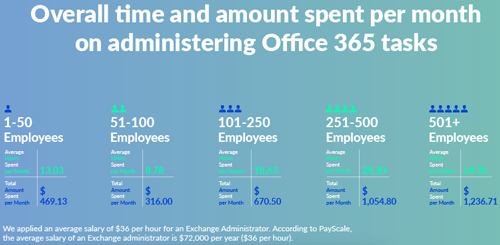Survey: Managing Office 365 Can Nearly Double the TCO for Smaller Organizations
A new survey by one of Microsoft's largest cloud solution providers (CSPs) takes a crack at quantifying the total cost of ownership (TCO) of Office 365 for organizations of different sizes.
In a report posted Monday, Champion Solutions Group of Boca Raton, Fla., detailed the results of a survey of 101 Office 365 administrators from organizations ranging in size from 1-50 users to more than 500 users.
The survey found that for small organizations, the costs of managing Office 365 can nearly double the per-seat cost of Office 365. Mileage varies dramatically in Office 365 deployments, but for a 50-seat deployment at an average cost per seat of $10 for a $500 per month bill from Microsoft, Champion found management costs would tack on an average of $469 more. The cost for a hypothetical large organization with 501 seats is proportionally much lower -- a $1,235 management cost on top of $5,010 in Office 365 subscription costs -- but still substantial.
 [Click on image for larger view.] Source: Champion Solutions Group. (Click here for the full version of this infographic.)
[Click on image for larger view.] Source: Champion Solutions Group. (Click here for the full version of this infographic.)
"The end-user community is spending a good amount of time on managing this endeavor, which is probably not the most strategic thing for an end user," said Chris Pyle, Champion's CEO, in an interview. "Small businesses are spending more time on it than large businesses because they don't have knowledgeable staff."
Champion, and its MessageOps business unit that specifically handles Microsoft cloud products, asked survey respondents to estimate how much time they spent on 10 administrative tasks. Those tasks were reconciling billing and invoices, as well as managing users and subscriptions, Active Directory and Active Directory Groups, compliance, mail flow, mobile platforms, permissions, protection, public folders and recipients. Management costs were calculated by multiplying hours spent against a $36/hour average salary for an Exchange administrator.
Pyle said he was most surprised by the amount of time smaller businesses spent on billing and invoice reconciliation. "I would think that people with larger implementations would be the ones most critical of the invoice, but it's the opposite," he said.
Even with all the management costs quantified, Pyle believes Office 365 is still a much better buy than on-premises Exchange Server, as it eliminates a lot of other questions. "How much time do you spend backing up your mailboxes? How much time do you spend retrieving a mailbox that's been deleted? How much time do you spend on failover testing a quarter? How much time do you spend on server performance? How much time does accounting spend, worrying about the depreciation cycle of the hardware?"
For Pyle, and Champion/MessageOps, the survey is an end-user selling tool, helping the company make the case to end users that they should outsource management of Office 365 to a partner who can do it more efficiently at less expense. But by releasing the survey, and its accompanying charts and data, Champion is giving end users and other partners some tools.
The sample size is too small to provide reliable data about size segments or vertical segments, but the report does give end users some broad benchmarks to start thinking critically about the whole cost of managing Office 365 and to compare their own cost estimates against peers.
Microsoft partners will also be able to use those numbers for benchmarking of their internal operations and for determining pricing on Office 365 management services. At the same time, the report gives partners some data points for marketing collateral as they build out their Office 365 practices and make the argument to customers for saving money by going with a partner as opposed to going it alone.
Posted by Scott Bekker on March 13, 2017